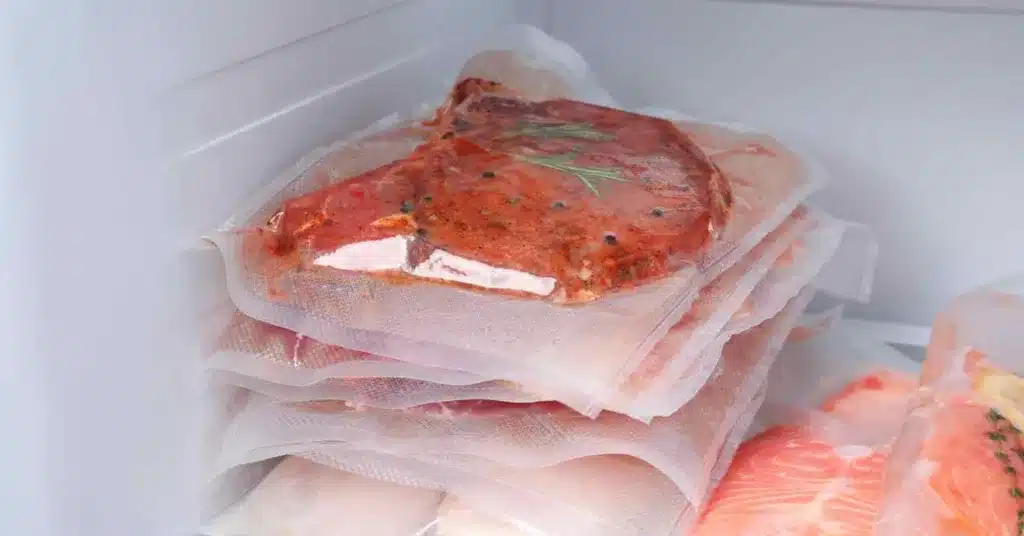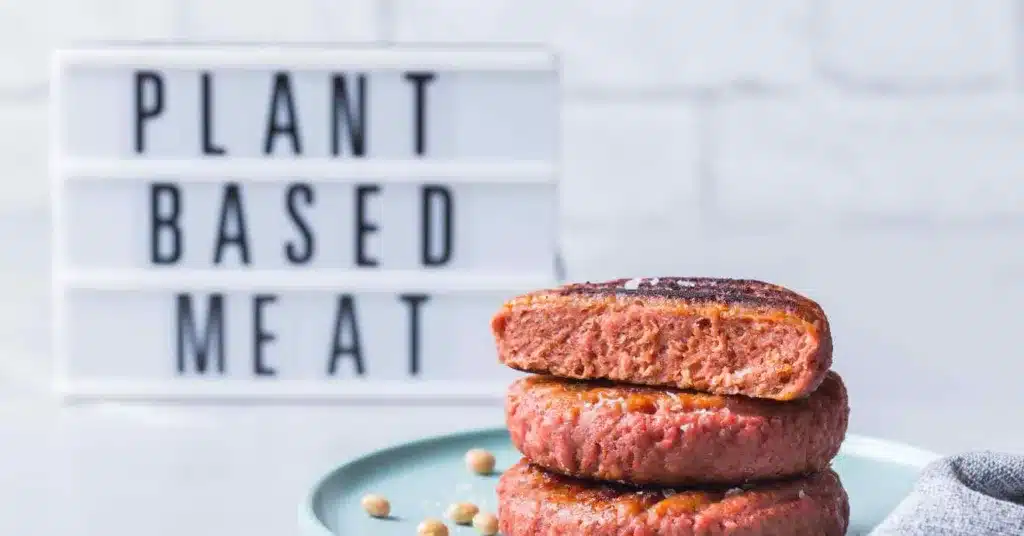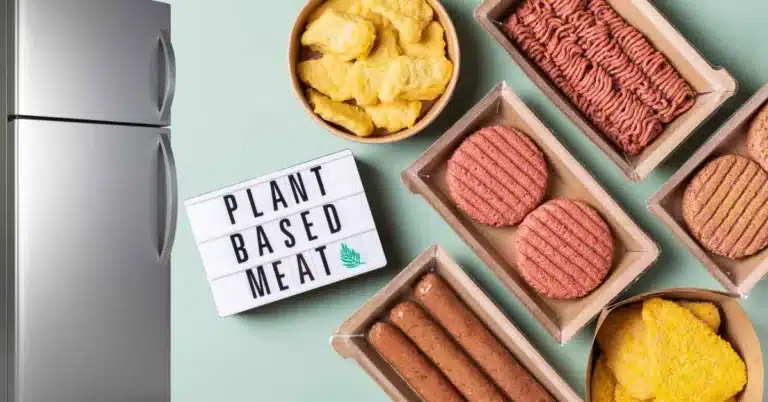As plant-based diets gain popularity, vegan meat has become a staple in many kitchens, offering a sustainable and health-conscious alternative to traditional animal products.
Meat substitutes, including burgers and sausages made from ingredients such as pea protein, soy, and various vegetables, aim to replicate the taste and texture of meat. They address environmental and ethical concerns associated with animal farming.
However, just like any perishable food, vegan meat has specific storage requirements to maintain its quality and safety.
This introduction explores the key aspects of storing vegan meat after cooking, including how long it can safely remain in the fridge and the best practices for extending its shelf life.
Table of contents
Understanding Vegan Meat
Vegan meat, also known as plant-based meat, is a culinary innovation created to provide a meat-like experience without using any animal products. Made from a variety of plant-based ingredients, these substitutes primarily utilize proteins from peas, soybeans, mung beans, and rice to recreate the texture and flavor of meat (Beyond Meat).
Ingredients such as coconut oil and cocoa butter are often added to enhance the juicy, fatty qualities that mimic traditional meat (Beyond Meat).
The process of creating vegan meat involves extracting protein from plants and using techniques such as heating, cooling, and pressure to simulate the fibrous texture of animal meat.
This not only makes the product appealing to vegetarians and vegans but also to those looking to reduce meat consumption due to health or environmental reasons.
Vegan meats are engineered to be freezer-friendly, maintaining their quality over extended periods when stored correctly, although they do have a limited fridge life once cooked or opened (Beyond Meat) (Home Kitchen Talk).
The growing interest in vegan meat reflects broader food industry trends towards sustainability and health-conscious eating.
As this sector evolves, understanding the composition and proper storage of vegan meats is essential for consumers aiming to integrate these products into their daily diets effectively.
Shelf Life of Vegan Meat in the Fridge

Understanding the shelf life of vegan meat in the refrigerator is crucial for maintaining its quality and safety. Typically, unopened vegan meat can last in the fridge for about 10 days if kept at the proper temperature. Once opened, it should ideally be consumed within 3 days to ensure it remains fresh and safe to eat. These timelines can vary slightly depending on the brand and the specific product type (Cuisine Seeker).
Vegan meats like Beyond Meat and Impossible Meat have specific guidelines recommended by their manufacturers.
For example, Beyond Meat recommends consuming their products within 3 days of opening, and if unopened, these products can last up to 10 days in the fridge provided that you properly maintain the temperature.
Similarly, Impossible Meat advises using their products within 3 days after opening to ensure optimal taste and safety.
Preserving vegan meat in the fridge requires more than just time monitoring. Consumers should set the refrigerator temperature below 40 degrees Fahrenheit (4 degrees Celsius) to inhibit the growth of harmful bacteria.
It’s also crucial to store vegan meat in airtight containers or securely wrap it to prevent cross-contamination and protect its quality from air exposure.
The guideline to consume vegan meat within a few days after opening is based on food safety principles aimed at minimizing the risk of foodborne illnesses.
While these products do not contain animal meat, they can still harbor bacteria if not stored correctly.
Observing the “best by” dates and adhering to storage recommendations are critical steps in ensuring that vegan meat remains a healthy and enjoyable part of your diet. For further information on storing food safely, including vegan products.
Freezing and Thawing Vegan Meat
Freezing is a popular method for extending the shelf life of vegan meat, allowing for longer storage without a loss in quality. Most vegan meats can be safely frozen for several months. Brands like Beyond Meat and Impossible Meat provide specific guidelines for freezing their products.
Typically, vegan meat can be frozen for up to six months, ensuring that it is stored in an airtight container or wrapped tightly to prevent freezer burn and flavor loss (Cuisine Seeker) (Home Kitchen Talk).
Thawing vegan meat, however, requires careful handling to maintain its quality. The recommended method is to thaw the products in the refrigerator rather than at room temperature.
This slower thawing process helps prevent the growth of harmful bacteria by keeping the meat at a safe, constant temperature.
It usually takes a day for vegan meat to thaw completely in the refrigerator, depending on the size and thickness of the product (Home Kitchen Talk).
Refreezing vegan meat is generally not advised, especially if it has been completely thawed.
Refreezing can affect the texture and taste of the product, as ice crystals that form during the initial freezing can cause the cells in the vegan meat to rupture, leading to a mushier consistency upon the second thaw (Sara’s Veggie Kitchen) (Smarterhomemaker.com).
For those who must refreeze, it’s crucial to ensure that the vegan meat has only been partially thawed and that it has been kept refrigerated throughout the process.
Signs of Spoilage in Vegan Meat
Recognizing the signs of spoilage in vegan meat is essential to ensure food safety and avoid the consumption of potentially harmful products.
Unlike traditional meat, the indicators of spoilage in vegan meat might not always be as pronounced, so knowing what to look for is crucial.
Firstly, note any visual changes in the vegan meat. Discoloration or the development of unusual spots can be a sign that the product is no longer safe to eat. Discard Vegan meat that starts to turn a different color, particularly greyish hues.
Another significant indicator is the texture of the product. If the vegan meat becomes slimy or overly sticky, it suggests bacterial growth and spoilage. This textural change is a clear sign that the vegan meat should not be consumed.
Odor is also a reliable indicator of vegan meat going bad. Any foul or sour smells are strong indicators that the vegan meat has spoiled.
Unlike animal meat, spoiled vegan meat might not emit the same strong, rotten smell, but it can still develop a noticeable off or yeasty odor when you open the package. This sign is often more apparent in vacuum-sealed vegan meats and should prompt you to discard the product immediately
It is crucial to observe these signs and dispose of any vegan meat that exhibits them, as consuming spoiled food can lead to foodborne illnesses. Always prioritize safety and when in doubt, throw it out.
Best Practices for Storing Vegan Meat

Proper storage of vegan meat is key to maintaining its freshness and nutritional value, as well as preventing foodborne illnesses. Here are some best practices for storing vegan meat effectively:
1. Refrigeration: Always store vegan meat in the refrigerator immediately after purchase. It’s important to keep it at a consistent temperature below 40 degrees Fahrenheit to prevent bacterial growth.
For guidance on setting the right refrigerator temperature and organizing your fridge to avoid cross-contamination, consider checking Understanding Food Labels.
2. Airtight Containers: Use airtight containers or securely wrap vegan meat to minimize air exposure.
3. Follow Expiry Dates: Pay close attention to the ‘use by’ and ‘best by’ dates on packaging. These dates are essential indicators of how long the vegan meat will remain at its best quality.
4. Proper Freezing Techniques: If you need to store vegan meat for an extended period, freezing is a viable option. Wrap tightly in freezer-safe materials.
5. Avoid Contamination: Keep vegan meat separate from other foods, especially raw foods. This prevents any cross-contamination and maintains the safety of all items within your fridge.
FAQs on Vegan Meat Storage and Safety
How long can vegan meat stay in the fridge after cooking?
You should consume cooked vegan meat within 3 to 5 days when you store it in the refrigerator. Make sure to store it in airtight containers or tightly wrap it to ensure freshness and prevent spoilage.
Can you freeze cooked vegan meat?
Yes, you can freeze cooked vegan for up to 2-3 months.
Is vegan meat safe to eat after the expiration date?
While some vegan meats might still be safe to consume a few days past the ‘best by’ or expiration date.
How can you tell if vegan meat has gone bad?
Signs that vegan meat has spoiled include an off smell, unusual color changes, and a slimy or sticky texture. If the package bloats or puffs up, this could also indicate bacterial growth, and you should not consume the product.
What is the best way to thaw frozen vegan meat?
The safest way to thaw frozen vegan meat is in the refrigerator. This method keeps the meat at a safe, consistent temperature and reduces the risk of bacterial growth. Avoid thawing at room temperature as it can lead to uneven thawing and potential food safety issues.
After thawing, can you refreeze vegan meat?
Generally, you should avoid refreezing vegan meat after you thaw it because this can alter its texture and flavor.
Conclusion
Proper storage and handling of vegan meat are essential to ensure its safety, quality, and longevity.
As vegan meat continues to grow in popularity, understanding these storage practices will help maintain its intended flavor and texture.

